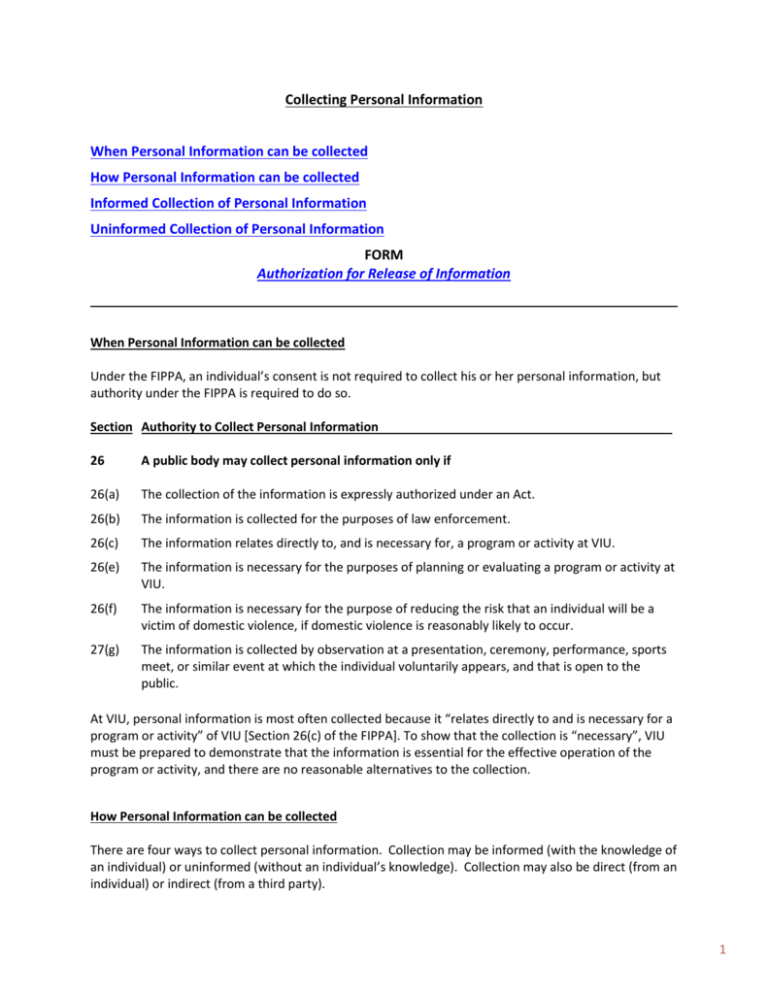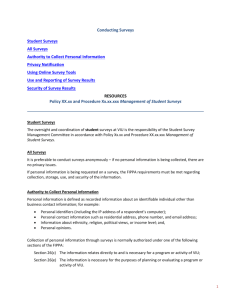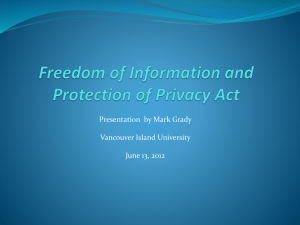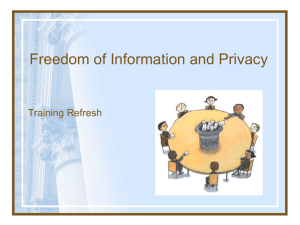How Personal Information can be collected
advertisement

Collecting Personal Information When Personal Information can be collected How Personal Information can be collected Informed Collection of Personal Information Uninformed Collection of Personal Information FORM Authorization for Release of Information When Personal Information can be collected Under the FIPPA, an individual’s consent is not required to collect his or her personal information, but authority under the FIPPA is required to do so. Section Authority to Collect Personal Information 26 A public body may collect personal information only if 26(a) The collection of the information is expressly authorized under an Act. 26(b) The information is collected for the purposes of law enforcement. 26(c) The information relates directly to, and is necessary for, a program or activity at VIU. 26(e) The information is necessary for the purposes of planning or evaluating a program or activity at VIU. 26(f) The information is necessary for the purpose of reducing the risk that an individual will be a victim of domestic violence, if domestic violence is reasonably likely to occur. 27(g) The information is collected by observation at a presentation, ceremony, performance, sports meet, or similar event at which the individual voluntarily appears, and that is open to the public. At VIU, personal information is most often collected because it “relates directly to and is necessary for a program or activity” of VIU [Section 26(c) of the FIPPA]. To show that the collection is “necessary”, VIU must be prepared to demonstrate that the information is essential for the effective operation of the program or activity, and there are no reasonable alternatives to the collection. How Personal Information can be collected There are four ways to collect personal information. Collection may be informed (with the knowledge of an individual) or uninformed (without an individual’s knowledge). Collection may also be direct (from an individual) or indirect (from a third party). 1 INFORMED UNINFORMED Direct Asking a job applicant to fill out an application form. Accessing a student’s I.T. account without his/her knowledge and reading his/her personal emails. Indirect Calling a job applicant’s references to check his/her credentials. Interviewing an employee’s co-workers without his/her knowledge to determine his/her suitability for an award. Informed Collection of Personal Information Under the FIPPA, it is preferable to inform individuals that their personal information is being collected by revealing the legal authority to request the information, how the information will be used, and who can answer questions about the collection. This is called a “privacy notification”: Privacy Notification: Your personal information is collected under the Authority of Section (A) of the Freedom of Information and Protection of Privacy Act, and (B). This information will be used for (C). Questions about the collection of this information may be directed to (D). Key: (A) Enter the paragraph of Section 26 of the FIPPA that provides the general legal authority for collecting the personal information – usually Section 26(c); the information relates directly to and is necessary for operating a program or activity at VIU. (B) Where applicable, enter any Federal or Provincial laws other than the FIPPA that provide specific legal authority for collecting the personal information. (C) Enter the purpose for collecting the personal information. If the information will be made available to the public, that should also be stated here. (D) Enter the title and phone number or email address of an employee of VIU who can answer questions about the collection of personal information; in most cases, an employee within the relevant program area. Where possible, the privacy notification should be in writing and should be prominently displayed on the form or webpage being used to collect personal information. It is not necessary for individuals to sign or initial the privacy notification. It is preferable to collect personal information directly from an individual. If information is being collected indirectly (eg. conducting reference checks of job applicant) then the privacy notification should clearly explain how it will be collected. . 2 Sample Privacy Notification for Direct Collection: Your personal information is collected under the authority of Section 26(c) of the Freedom of Information and Protection of Privacy Act (FIPPA). This information will be used for the purpose of evaluating your application for admission to VIU. Questions about the collection of this information may be directed to admissions@viu.ca. Sample Privacy Notification for Indirect Collection: VIU may contact your references to determine your suitability for employment. Your personal information is collected under the authority of Section 26(c) of the Freedom of Information and Protection of Privacy Act (FIPPA). This information will be used for the purpose of evaluating your application for . Uninformed Collection of Personal Information Uninformed collection of personal information is only permissible under exceptional circumstances. For example: 27(1) A public body must collect personal information directly from the individual the information is about unless 27(1)(a.1) The collection of the information is necessary for the medical treatment of an individual and it is not possible to collect the information directly from the individual. 27(1)(c)(i) The information is collected for the purpose of determining suitability for an honour or award including an honorary degree, scholarship, prize, or bursary. 27(1)(c)(ii) The information is collected for the purpose of a proceeding before a court or a judicial or quasi-judicial tribunal. 27(1)(c)(iii) The information is collected for the purpose of collecting a debt or fine or making a payment. 27(1)(c)(iv) The information is collected for the purpose of law enforcement. 27(1)(c)(v) The information is collected for the purpose of reducing the risk than an individual will be a victim of domestic violence, if domestic violence is reasonably likely to occur. 27(1)(f) (a) the information is about an employee; (b) the collection is necessary for the purposes of managing or terminating an employment relationship between VIU and the employee; and, (c) it is reasonable to expect that notification would compromise the availability or the accuracy of the information, or an investigation or proceeding related to the employment of the individual. 27(3)(d) The information is collected by observation at a presentation, ceremony, performance, sports meet, or similar event at which the individual voluntarily appears, and that is open to the public. 3




